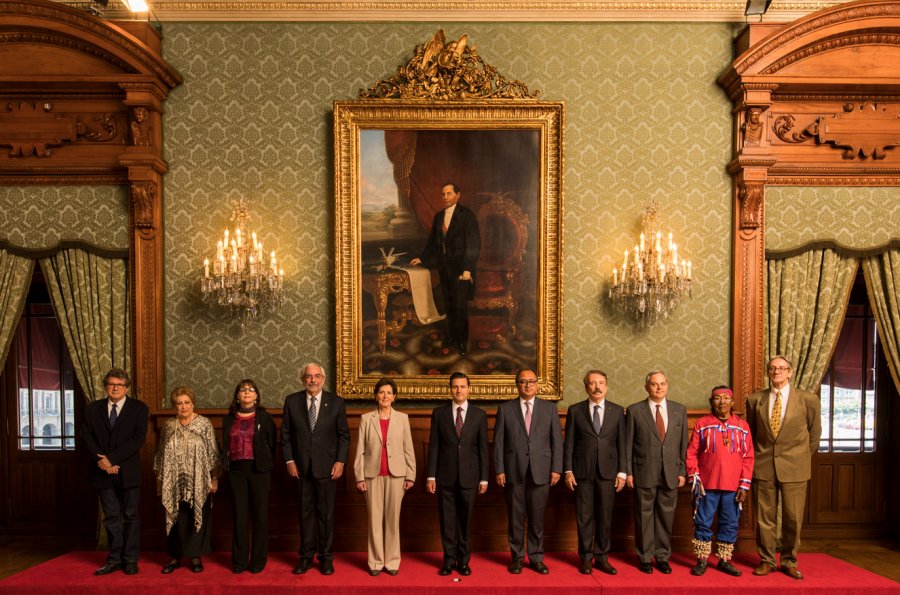Noticias
Presentation of the 2017 National Science, Arts and Literature Awards
April 02, 2018At the ceremony, held in the Ambassadors Hall of the National Palace, President Enrique Peña Nieto recalled that in 1945 the Government of the Republic awarded the National Science and Arts Prize for the first time, "and 70 years later, in 2015, with the creation of the Department of Culture, the Prize was transformed into two awards: the National Science Prize and the National Prize for Arts and Literature".
The Head of the Federal Executive pointed out that the winners today "are an inspiration for the new generations, and by their example they reaffirm the importance of having a quality education that allows all Mexicans to have access to science and culture".
"Creative freedom and critical thinking are essential values of a democracy. Our country would not be the same if it did not have this freedom, which has allowed great Mexicans to build the valuable scientific and cultural legacy they have inherited from us. Only through the creative process and critical thinking will we continue to grow as a nation," he said.
He expressed his appreciation to the Mexican creators and researchers, whose work is essential to promote the generation of knowledge and scientific innovation. "Thank you very much for making our nation bigger, for making it a better country, based precisely on the contributions that come from your career, your creativity and the personal talent of each one of you," he told them.
During the event, the President of the Republic presented the National Prize for Arts and Literature:
In the field of History, Social Sciences and Philosophy, the award went to Mercedes de la Garza Camino, who has dedicated her professional life to studying and spreading the richness of the Mayan culture.
In the field of Popular Arts and Traditions, Francisco Barnett Astorga was awarded for supporting the preservation of the traditions of the Seris in Sonora.
In the field of Fine Arts, the award went to Nicolás Echevarría Ortiz, for his films that have left a profound mark on the history of our culture; and
And in the field of Linguistics and Literature, Alberto Ruy Sánchez was awarded for his outstanding career as a narrator, essayist and editor.
He also gave the National Science Prize:
In the field of Physical-Mathematical and Natural Sciences, the award went to María Elena Álvarez-Buylla Roces, for her contributions to the preservation of the biological diversity of our country.
In the field of Technology, Innovation and Design, Emilio Sacristán Rock was awarded for his promotion of biomedical engineering, including the development of several technological advances, such as an artificial heart.
The President stated that "the central objective of this Government has been the transformation of institutions to better serve our country. One of these changes, which has perhaps not received as much attention as other reforms, has been the transformation of the cultural sector”.
“The creation of this Secretariat has made it possible to promote culture based on values such as creative freedom, social sense, links with education and the projection of Mexico's legacy in the world," he said.
He expressed his gratitude to the Advisory Council of the Department of Culture, made up of outstanding artists, academics and researchers, "who have devoted their valuable time to culture and art with great generosity".
THE GOVERNMENT OF THE REPUBLIC DISTINGUISHES CULTURE AND SCIENCE AS A FUNDAMENTAL PART OF THE COUNTRY'S POLITICAL AGENDA: MARÍA CRISTINA GARCÍA CEPEDA
The Secretary of Culture, María Cristina García Cepeda, said that the National Prize for Science, Arts and Literature, which recognizes Mexicans who contribute their talent, intelligence and creativity to enrich the country's cultural heritage, reaffirms the commitment of the institutions of the Government of the Republic to distinguish culture and science as a fundamental part of the country's political agenda.
The creation of the Department of Culture is "a decision that summed up the will of all the social sectors, that sows today a wide horizon for Mexicans and that will continue to be strengthened for the benefit of future generations", she said.
The Department of Culture "has as its framework a broader process of change in the country that has given way to a series of structural reforms in the most important sectors of the nation's economic, political and social development, she said.
"Arts, science, literature, history and our popular expressions are the homeland and duty of the Mexicans; they nourish us with their deep roots, they give us great wings to imagine and work with.
KNOWLEDGE, EDUCATION, IDEAS AND REASON ARE OUR ONLY DEFENCE AGAINST UNCERTAINTY AND BACKWARDNESS: OTTO GRANADOS ROLDÁN
Otto Granados Roldán, Secretary of Public Education, said that the National Science Prize, awarded each year by the Mexican State, not only recognizes "the trajectory of exceptional people in the field of research, innovation and scientific and technological development, but also symbolizes in its people the centrality of having a world-class human capital for a country”.
The prizewinners, he said, "are also examples of the gradual transition that is taking place in the country's higher education system from a model that is basically a generator of degrees or degrees to one that generates relevant knowledge, and that scientific and technological progress is not positive or negative in itself, but rather a function of the use we make of it, determined in large measure by the public value of the innovations made by our scientists and inventors".
The Head of the SEP affirmed that to reward creators, artists, scientists and innovators "is to recognize the talent, work and trajectory of a remarkable group of Mexican men and women, but it is also and above all, to trust that knowledge, education, ideas and reason are our only moral, cultural and political defense in these confused times against barbarism, uncertainty and backwardness".
Mexico,Distrito Federal
